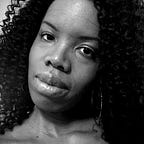Don’t soften our substance.
I first saw the video at the head of this Op-Ed tonight on Instagram.
Its beauty, honesty, and power touched me.
And yet something strange happened.
A part of me winced when I heard the phrase “women of colour”. (Spelled with a “u” here, just before I get into my rhythm because yes, I’m Canadian.)
We are Black. It is ok.
Some find Blackness upsetting. Racists certainly find it ugly. Yet neither of those ideas take away from the fact that scores of us wake up every day and go to bed every night being both Black and female.
If the truth of this combination offends you, I can’t help you.
But why do people use “woman of colour” when they’re referring specifically to Black women?
In my mind, as soon as I asked that question the etymological hunt had permission to begin.
My search was not a long one. A request for the origins of the term “women of color” led me to Loretta Ross, a Black woman academic and activist.
“…when they took the Black Women’s Agenda to Houston, then all the rest of the “minority” women of colour wanted to be included in the ‘Black Women’s Agenda.’”
And so, Black women were made to accommodate other racialized women under the banner of something that we created.
But when something is meant specifically to refer to Black women — when someone is speaking to and about Black women, specifically, I can promise you that it’s ok to say Black women.
Here, I will confess: In the past I’ve used “women/people of color” , in reference to Black women or Black people. But only after I’ve attempted to set a firm foundation indicating that I was prioritizing Black individuals.
Meanwhile, whenever others use “women” or “people” of color when they specifically mean Black people, I get concerned.
“it is a solidarity definition, a commitment to work in collaboration with other oppressed women of color who have been ‘minoritized.’”
Outside of Loretta Ross’ statement, I need freedom to speak.
Although certain experiences among people of color are similar, it is not fair to habitually designate Black people as people of color. In spite of the desire for solidarity, there are conflicts. Among folks of Asian, Indigenous, and Latino ancestry, there are those who are prejudiced against Black people. In my lifetime I’ve encountered such people.
Even when I acknowledge my understanding of why the term “women of color” was invented, I would say that it has a time and place: Namely when discussing a group of women of various races, who are not white.
Meanwhile, I cringe over the use of “women of color” when referencing Black women, because it is not an adequate identifier. Also, Blackness needs to be destigmatized. There is nothing wrong with a woman being Black. There is nothing wrong with the way I was created. There is nothing wrong with me.
And I realize that some Black people use “…of color” out of habit. Still, others — regardless of race — seem to use it as a sort of safety measure. I can only assume that those folks want to gain their audience’s sympathy. Perhaps they feel that their intent will be hampered by consumers’ fears. Yet Blackness is nothing to be afraid of. Just as some Black folks insist a perm will save us from those who despise natural hair, in the end, if it’s one’s Blackness that’s bothersome to someone, no superficial change will make a difference.
